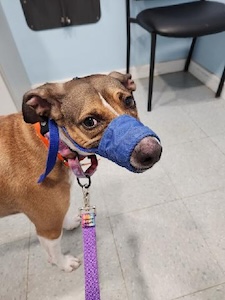Does doggie anxiety at the vet mean the animal is “dangerous”?
 A negligence standard often applies in PA, for dog bite liability; namely, did the dog owner have prior reason to know of the animal’s dangerous propensity? Many things serve as evidence of a dangerous or “vicious” propensity. These include growling, chasing people, and attacking other animals. But what about what about the dog displaying mere anxiety at the vet? Is it enough to show “dangerous propensities”?
A negligence standard often applies in PA, for dog bite liability; namely, did the dog owner have prior reason to know of the animal’s dangerous propensity? Many things serve as evidence of a dangerous or “vicious” propensity. These include growling, chasing people, and attacking other animals. But what about what about the dog displaying mere anxiety at the vet? Is it enough to show “dangerous propensities”?
This issue was decided by PA’s superior court, recently.
MR EX REL. ASHBY v. Bunting
Our Pittsburgh lawyers focus on dog bite cases; we often blog about the liability for harboring a “dangerous dog” in Pennsylvania, so one recent case caught our eye.
In MR EX REL. ASHBY v. Bunting, No. 1328 EDA 2021 (Pa. Super. Ct. Feb. 18, 2022)(non-precedential), PA’s superior court addressed whether doggy anxiety at the vet can give the dog owner reason to believe the dog could be dangerous. There, the bite happened as follows:
On May 27, 2018, around noon, [dog owner] went to a water park, leaving [injured plaintiff] and Ms. Ashby alone in the home with Ruger. The dog whimpered and paced between the door and window immediately after [dog owner] left but then settled down. Around 5 p.m., [injured plaintiff] and Ms. Ashby were in the kitchen when Appellant dropped some candy on the floor. As he bent down to pick it up, Ruger lunged for the candy and bit [injured plaintiff] on the lip. Ms. Ashby took him to the hospital where doctors sutured the wound, leaving a scar above [injured plaintiff’s] lip.
A lawsuit was filed by the injured plaintiff against the dog owner, above. The trial court dismissed the case, and the injured plaintiff appealed to the superior court of Pennsylvania. The Superior court noted the trial judge’s decision:
Looking at the pleadings and the testimony from the depositions, we do not believe that [Appellant] has presented enough evidence to show that “Ruger” had vicious propensities prior to this incident. It is common for dogs to get nervous when they are around strangers or at the veterinarian’s office; however, that nervousness does not mean that they are vicious.
Negligence Standard in PA
The superior court then described the negligence standard that applies in Pennsylvania, with some exception. Most states have a “strict liability standard” for dog bites, but Pennsylvania’s farming and pro-dog history has resulted in a negligence standard that is applied quite often in Pennsylvania, as follows:
This Court has held that in order to prevail in a negligence action against a dog owner in a dog bite case, a plaintiff must show that the owner knew or had reason to know of the animal’s display of dangerous propensity. Franciscus v. Sevdik, 135 A.3d 1092, 1094-95 (Pa. Super. 2016). Thus, evidence must be presented to establish (1) the dog displays vicious tendencies; (2) the animal’s owner has reason to know or knows that the animal has those dangerous propensities; and (3) the owner of said animal failed to act prudently in response to those vicious or dangerous propensities. Kinley 876 A.2d at 422. See also Deardorff v. Burger, 606 A.2d 489, 492 (Pa. Super. 1992) (“mere awareness and ownership of a vicious animal does not per se expose one to liability for injuries inflicted absent a failure on the part of the owner to take proper precautions to preclude that viciousness from exhibiting itself.”)
The superior court reviewed the evidence:
Based on our review of the record, we conclude the trial court did not abuse its discretion or err as a matter of law in granting summary judgment. Appellee, Mr. Bunting, and Ms. Ashby each provided deposition testimony regarding Ruger’s behavior prior to the incident and none of them said that Ruger had vicious tendencies or had ever displayed aggressive behavior.
What about the Doggie Anxiety at the Veterinarian?
The superior court noted that many dogs get nervous at the veterinarian. Thus, the court looked for something more than mere doggie “anxiety” at the vet. Ultimately, the superior court ultimately found:
In addition, veterinarian’s records did not indicate that Ruger was aggressive or had previously bitten anyone. (emphasis added)
Lacking Proof of a Prior Bite
It is worth noting that the dog in MR EX REL. ASHBY, above, had allegedly bitten someone before, but the plaintiff’s attorney never placed before the court an affidavit from the witness to the prior bite. For this reason, the superior court upheld the trial court’s decision to dismiss all claims against the dog owner via summary judgment.
All dog bite lawyers should take note of the importance of proof of a prior bite. Pennsylvania Dog Law does not require evidence of a prior bite, it sure would have helped the Plaintiff’s case, here.
Our Pennsylvania attorneys provide a free consultation in any dog bite claim or defense. Call a Pittsburgh lawyer at our firm today!
New Number! 412.400.5476
Or Use Our Contact Form